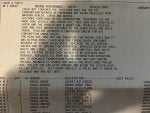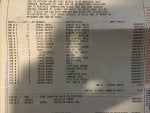This thread is intended to give some of you some more data to play around with with regards to the oil consumption issue that is common with the 1.6 and 2.0 Kia Engines. My Soul is a 2017 1.6 liter base model with a manual transmission. Around 30k I noticed loss of oil, about .5 to 1 quart every 1000 miles or so. I logged this data and kept track of how much oil I was using. Around 60k I noticed a sound that sounded like a piece of my exhaust was coming loose. It seemed to go away after the car warmed up. I eventually took my Kia to the dealer where they said a cylinder or bearing was bad and they replaced the entire short block, basically the bottom part of the engine. They replaced a ton of of other things once they tore the engine down. This was all done under warranty. I will scan and upload the mechanics notes on all parts replaced. I used 5w20 conventional for the first 15k to break the engine in and then switched to 5w20 synthetic after that. I did try 5w30 after I noticed oil consumption but it didn't seem to slow down or decrease consumption. Brands used were Castrol Magnatec, Mobil 1, SuperTech and Valvoline. Mostly Magnatec. Oil change intervals were right around 5k with the initial 5-6 changes around 3k. I did have one that went around 6k.
I see this as a problem with all the 1.6 liter engines and I don't think Kia will have rolling fixes to solve the inherent problem. I think this same issue will happen again with my rebuilt motor. I am using 5w30 GTX ultraclean synthetic blend in the motor now and it has approx 2k on this oil. I am looking for a thicker 5w30 synthetic to stick with from now on. I have seen that QS Full synthetic and Mobil1 5w30 seem to be on the thicker side. I have also considered a 10w30 but do not see the benefit as many of these have listed viscosities lower higher than the 5w30s at operating temperature. If any of you have any questions or comments for me please feel free to ask.
I see this as a problem with all the 1.6 liter engines and I don't think Kia will have rolling fixes to solve the inherent problem. I think this same issue will happen again with my rebuilt motor. I am using 5w30 GTX ultraclean synthetic blend in the motor now and it has approx 2k on this oil. I am looking for a thicker 5w30 synthetic to stick with from now on. I have seen that QS Full synthetic and Mobil1 5w30 seem to be on the thicker side. I have also considered a 10w30 but do not see the benefit as many of these have listed viscosities lower higher than the 5w30s at operating temperature. If any of you have any questions or comments for me please feel free to ask.






